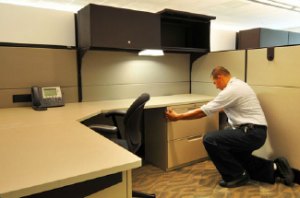 Setting up an office is quite a task. From deciding the location to furnishing the office, it is time-consuming and requires a lot of effort. In addition to this, moving your office to a new area is labor-intensive.
Setting up an office is quite a task. From deciding the location to furnishing the office, it is time-consuming and requires a lot of effort. In addition to this, moving your office to a new area is labor-intensive.
This task is best left to the experts. If you are moving to a new office, consider this office moving checklist pdf to prepare you for the move.
When setting up an office, you have the option to buy, rent, or lease office space. If you are considering these options, it is always best to get a professional on your team to make sure you avoid any costly mistakes. Each of these choices has advantages as well as disadvantages.
Buying Office Space
Buying a property requires capital. Most small to medium sized businesses lack the resources to purchase office space or they choose to use their capital to grow thier businesses. However, for larger companies and corporations, buying an office space is an investment many choose to make.
Pros
- Mortgage payments that will not increase.
- Mortgage payments add to equity.
- Appreciation over the long term.
- You can rent it out excess office space and benefit from an additional source of income.
Cons
- Buying requires a large amount of capital investment.
- Opportunity cost of that capital investment.
- Difficult to scale up in case of an expanding business.
- You are responsible for repairs and maintenance, taxes and insurance.
Renting Office Space
In renting office space, it is usually a shorter-term period. You have the option to rent the space on a month-to-month basis or for a year or two. As with any contract for space, make sure to review the agreement thoroughly.
Pros
- Allows for more flexibility in length of term.
- Businesses have the option to relocate according to their needs.
- Renting does not require a large investment.
- The money is not tied up in the real estate and can be invested in the business in another way.
Cons
- Monthly payments will increase over time with renewals.
- Landlord may choose not to renew forcing you to move.
Leasing Office Space
Leasing office space is for a longer term period. Usually 2 – 10 years.
According to Statista.com, tech companies prefer leasing instead of buying a commercial property. Despite COVID-19 hampering business growth, tech companies were able to lease about 1.2 million square feet in the United States alone.
Pros
- Monthly rental payments will be consistant for a longer period than renting office space.
- Less capital is needed to lease office space than if you were to buy it.
- The landlord is typically responsible for repair and maintenance of your office.
- Leasing a property offers tax deductions.
- At the end of the leasing period, you have the option to leave or renew the contract. So it offers some growth flexibility.
Cons
- If you renew a lease, the terms of the contract may change, and rent may increase.
- You have to comply with the requirements of the landlord.
Conclusion
Deciding on buying, renting, or leasing a property, is a big decision. A company’s business goals and growth prospects should be cinsidereed in making a suitable choice. In addition to this, the location of the office, the terms of a contract, the duration of renting/leasing, requirements of your employee, facilities, and other factors must be considered. Hence, you should take your time in deciding.
it is always best to get a commercial real estate professional on your team when making the buy, rent, or lease office space decsion to make sure you avoid any costly mistakes. This is the type of work they do day in and day out. They know what they are doing and represent you. The biggest mistake you can make is not having a professional on your team! Find one here.
